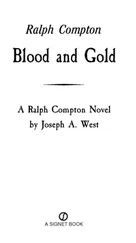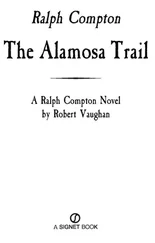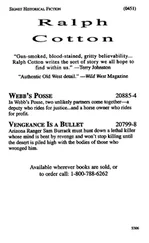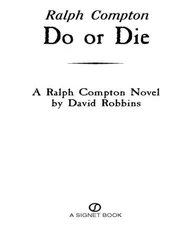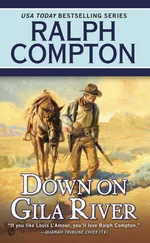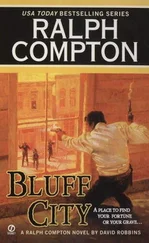Snakes in the Grass
Icy fingers clutched at Boone’s chest as he realized what he had done. He had taken his eyes off the grass. He remedied that just as the ground in front of the palomino erupted and out of it reared an Apache. Boone glimpsed a stocky, swarthy body clothed in a long-sleeved brown shirt and a breechclout and leggings. He saw steel flash, and he fired from the hip, two swift shots that slammed the Apache back and down.
Boone used his spurs. To his right and left more figures reared, and they had rifles. He fired at a warrior on the left, swiveled, and fired at a warrior on the right just as the warrior’s rifle banged. Pain seared his side but he didn’t stop.
Ahead rose two more, with bows this time. Strings twanged and arrows took flight. Boone fanned a shot, but the Apaches went to the ground. He reined to the left just as a feathered shaft whizzed past his neck. He was not as lucky with the second. It sheared into his left shoulder, and the shock nearly unhorsed him.
The palomino was at a gallop. Soon the Apaches fell behind; they never kept coming once it was pointless. They would follow, track him at their own pace, and if his wounds brought him down, they would finish what they had started. . . .

THE IMMORTAL COWBOY
This is respectfully dedicated to the ‘‘American Cowboy.’’ His was the saga sparked by the turmoil that followed the Civil War, and the passing of more than a century has by no means diminished the flame.
True, the old days and the old ways are but treasured memories, and the old trails have grown dim with the ravages of time, but the spirit of the cowboy lives on.
In my travels—to Texas, Oklahoma, Kansas, Nebraska,
Colorado, Wyoming, New Mexico, and Arizona—I always find something that reminds me of the Old West. While I am walking these plains and mountains for the first time, there is this feeling that a part of me is eternal, that I have known these old trails before. I believe it is the undying spirit of the frontier calling, allowing me, through the mind’s eye, to step back into time. What is the appeal of the Old West of the American frontier?
It has been epitomized by some as the dark and bloody period in American history. Its heroes—Crockett, Bowie, Hickok, Earp—have been reviled and criticized. Yet the Old West lives on, larger than life.
It has become a symbol of freedom, when there was always another mountain to climb and another river to cross; when a dispute between two men was settled not with expensive lawyers, but with fists, knives, or guns. Barbaric? Maybe. But some things never change. When the cowboy rode into the pages of American history, he left behind a legacy that lives within the hearts of us all.
— Ralph Compton
Brothers Born
The Civil War was over.
The horror of citizen brother pitted against citizen brother ended with the brothers from the North killing more of their brothers from the South than the brothers from the South could kill of their brothers from the North. The South surrendered while they still had brothers left.
The brothers from the South went back to a land blighted by the brutal slaughter.
Many of the brothers from the North went back to their old lives too. But some wanted something new.
Ned Scott was from the North. He was born and raised in the same state as the president, who had decided that spilling blood was the only way for brothers to settle a dispute.
Ned enlisted early in the war and went off to fight his brothers in gray. He enlisted not because he thought slavery was the greatest evil ever known, although he did believe no man had the right to lord it over another because his skin color happened to be different. He enlisted not to preserve the glory of the Union, although he did believe in the Constitution of the United States of America and felt the states should stay united and not break apart.
Ned enlisted because he wanted excitement in his life. At the start of the war he worked as a clerk and made enough money for him and his wife, Lillian, and their young son, Epp, to get by. During the war he was granted leave to go home for a week, with the result being that after the war he had another mouth to feed in the form of his second son, Boone.
Ned knew he had been fortunate. Many thousands killed, many thousands maimed, and he had gotten through the war without a scratch. It helped that he was assigned to the artillery and not the regular infantry or the cavalry. He got to lob cannonballs at the enemy and blow them apart from a distance rather than rush up to them and bayonet them in the guts.
With the war at an end, Ned needed to keep feeding the mouths of his family. He could not go back to being a clerk. The very notion made him cringe. Clerk work was boring, the same dull routine day in and day out. The prospect of spending the rest of his days in a cage made of stocked shelves scared him more than the cannonballs his brothers from the South had lobbed at him during the war.
Ned did what many young veterans were doing. He decided to head west. Land was to be had for the taking and a man could make something of himself if he was willing to take a few risks. Hostiles were one of those risks. Renegade whites were another. Wild beasts, floods, starvation and dying of thirst were also on the list, but Ned considered them minor nuisances compared to the boredom of clerk work.
So it was that in 1866 Ned packed his family onto a Conestoga and lumbered west at the vanguard of the restless tide seeking more out of life than was offered east of the Mississippi River.
Ned and Lillian had talked it over. Ned did most of the talking and Lillian did most of the listening. First Ned wanted to head for Texas, but Lillian said there were Comanches in Texas, and of all the red devils ever born, Comanches were the worst. She refused to live in Texas no matter what. Next Ned proposed they go to Oregon country, but Lillian said that meant they would live at the far end of the continent and she would hardly ever get to see her parents. She refused to live in Oregon no matter what.
‘‘How about Arizona Territory?’’ Ned asked. He did not know much about it other than that Congress had created the territory a few years ago and there was supposed to be a lot of land for the taking. There were also supposed to be Apaches, but he did not know much about them either, and he decided not to mention them after Lillian’s tiff over Comanches.
Arizona Territory it was.
The hand of Providence had kept Ned safe during the war, and the hand of Providence was at work again as Ned crossed the mile-wide Mississippi and ventured where few white men had ventured before him. He and his family made it across the vast prairie to Bent’s Fort and joined a freight train to Santa Fe. From there they rattled and clattered to the southwest until they came to Phoenix, and from there drifted to Tucson.
Lillian was tired of traveling and tired of living out of a wagon and just plain tired. She told Ned he had better find a place for them to live and he had better find it quick, and Ned, startled by her rare burst of temper, then and there made up his mind.
Ned had heard about a valley. An old man with a beard down to his waist and a bottle of whiskey in his hand had been leaning on a post outside a Tucson saloon when Ned brought his wagon to a stop in the dusty street. The man asked Ned where he was from, one thing led to another and the old man told Ned about the valley.
It was between the San Pedro and the San Simon rivers, and south of the Galiuro and Pinaleno mountains. It had that rarity of rarities in Arizona, a year-round stream. The grass grew green and there was plenty of it, the old man assured Ned. The old man had stumbled across it during his trapping days, and he would live there himself except that it was too far to Tucson, and whiskey.
Читать дальше


